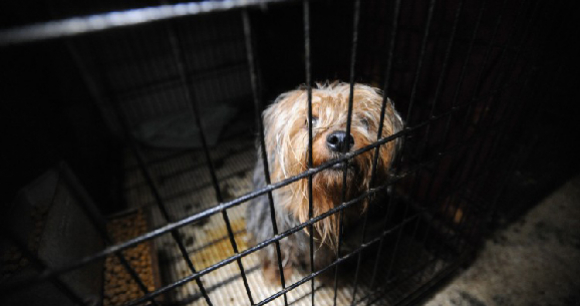
Bringing a dog into one's life and home can be a wonderful thing. When many decide to search for the perfect canine companion, they go “window shopping” at the pet store or, increasingly, online—where cute puppies might frolic behind the glass or stare soulfully through the computer screen. Unfortunately, most of these puppies encountered in either location come from extremely broken homes: puppy mills.
Puppy mills are operations where people breed large numbers of dogs to sell in the commercial pet trade. Puppy mills are also places where profits take precedence over animal welfare. Consumers are intentionally prevented from ever seeing the breeding operations because they would be appalled at what they would find. At the mills, the animals are not recognized as sentient beings; rather, they are mere production stock.
Breeding animals typically spend their entire lives confined in small, barren wire cages. The females are denied an opportunity to rest and recuperate between litters. Once they are physically worn out and stop reproducing successfully, they are dumped or killed. The kennels are overcrowded, filthy and dimly lit for the dogs, and there is no socialization, let alone nurturing or opportunity for play outside the confines of the cages.
Generally the breeders have no concern for genetic issues, either, that may be passed from parents onto the young such as heart disease, kidney disease, hip dysplasia, and cataracts. The lineage of the puppies may even be falsified so the animals command a higher price.
Some operations are supposed to be regulated under the Animal Welfare Act, but enforcement is lax. Others circumvent the law by selling puppies directly to the public, oftentimes via the Internet. The transactions take place far removed from the kennels—in pet stores, online, via brokers, or in a staged setting intended to dupe the public.